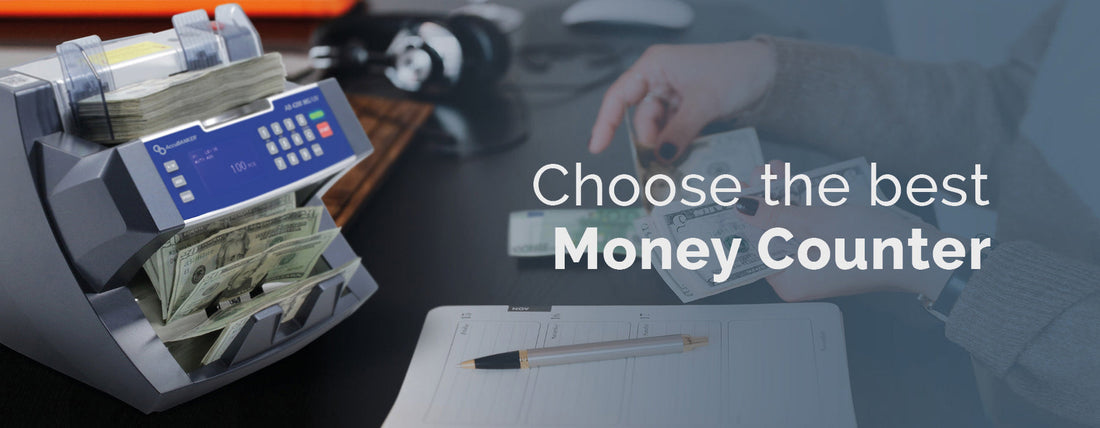Managing cash efficiently and accurately is a critical operation for any business, but are you tired of spending hours manually counting cash at your business?
Improve the accuracy and efficiency of your cash-handling process with AccuBANKER.
#BecauseYourMoneyCounts, we will help you choose the right money counter.
Counting bills might seem simple, but with over 40 years of experience, we’ve learned it is time-consuming and prone to mistakes. That’s why investing in a reliable money counter is essential if your business engages in cash transactions.
Save time, improve accuracy, and take your business to the next level.
The importance of money counters for businesses
Time is money, literally. Did you know that manual cash counting can consume an astonishing amount of time? On average, an experienced cashier takes 2 to 3 minutes to count 100 bills accurately.
Money counters are practical and accurate solutions for businesses as they automate money-counting processes and prevent counterfeits from being accepted. They are designed to accurately count large amounts of cash in seconds and help employees save valuable time and provide precise counts.
Businesses that routinely handle cash-based transactions—such as retail stores, restaurants, banks, laundromats, and casinos—will significantly benefit from AccuBANKER’s money counters. These machines facilitate the counting procedure while incorporating added layers of security that identify counterfeit bills, all backed by an extended 3-year warranty.
Bill counters, also recognized as money-counting machines, streamline currency calculations and embed security measures, including counterfeit detection. Given the ineffectiveness of counterfeit pens, due to sophisticated counterfeiting techniques employed by fraudsters, it is now crucial to invest in a money counter to effectively safeguard your business.

Different types of money counters
At AccuBANKER we have designed different types of money counters to make sure you choose the most efficient model based on your specific needs.
You will find four main types of money counters:
Bill Counters
Designed to count paper and polymer currency up to 1,800 bills per minute and are so precise that they detect chained, double, or folded bills, and are equipped with state-of-the-art technology security features such as UV, MG, MT, IR, & DD to detect counterfeit bills.

Value Counters
Similar to Bill Counters, these machines count paper and polymer currency but have added sensors that not only count but also calculate the total value, offering detailed reports of the operation.
Learn about ABCashRoom Pro
Coin Counters
These units are specifically designed to count and sort coins. They are equipped with mechanisms that automatically sort coins based on their diameter and thickness. This significantly reduces the time and effort required to process and count coins manually. Additionally, some coin counters can also wrap coins into coin rolls, making it easier to handle and deposit them in banks.
Money Scales
Money Scales are the latest addition to our family of counters and are precisely engineered to accurately weigh bills, and coins, perfect for quick audits and closings.
If you know you need a money counter - And most businesses do, but are uncertain about the ideal money counter for your needs, take your business’s nature and daily bill-handling volume into account. Our customer service team stands ready to guide your choice, or you can utilize our online comparison tool to review models side-by-side.
What to consider when choosing a money counter
Bill counters that go beyond counting bills:
Features that help your money-counting process
By aligning your business prerequisites with pertinent features, you can opt for a money counter that elevates your cash-handling procedures, ushering in enhanced efficiency.
The act of selecting the right money counter for your business necessitates the consideration of several factors:
-
Counting Modes: Bill counters have added functions that help users organize their cash by counting mixed bills, sorting, organizing by face and/or orientation, dispensing, and batching.
-
Currency Capacity: Does your business deal with international currencies? All bills differ in size, design, and have specific characteristics that must be considered.
-
Counting Speed: The counting speed of a money counter refers to the number of bills or coins it can count per minute and is mostly important for businesses with a high volume of cash transactions since it will help save time.
-
Accuracy: Exactitude is paramount when it comes to money counting. At AccuBANKER we equip our money counters with security features that detect folded, chained, and double bills to minimize the risk of errors when counting bills.
-
Space Constraints: Evaluate the available space to place your money counter and ensure it fits comfortably. If space is limited, consider smaller or portable models. Our D700, a dual-capability unit, is only half the size of a traditional money counter and is a counterfeit detector with bill-counting capabilities.
-
Portability: If your business operates across several locations – consider a portable unit that will accompany you on the go. We offer units with an external rechargeable battery that will let you work for up to 8h.
- Counterfeit Detection: This feature allows you to count money fast and accurately while protecting your business with up to 5 counterfeit methods engineered into every unit.
With more than 40 years of experience, we have become a trusted name worldwide, offering a range of money counters designed to suit various business needs. Whether you run a small shop or a large corporation, we will protect your bottom line and optimize your cash-handling operations.

